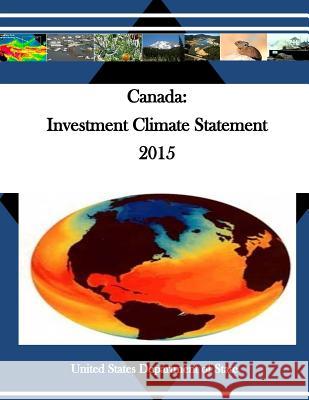Canada: Investment Climate Statement 2015 » książka
Canada: Investment Climate Statement 2015
ISBN-13: 9781530700134 / Angielski / Miękka / 2016 / 26 str.
Canada and the United States have one of the largest and most comprehensive investment relationships in the world. U.S. investors are attracted to Canada's strong economic fundamentals, its proximity to the U.S. market, its highly skilled work force, and abundant resources. The United States accounts for over 51 percent of Canada's total stock of foreign direct investment (FDI). U.S. stock of foreign direct investment in Canada reached USD 368 billion in 2013; while Canada's foreign direct investment stock in the United States totaled more than USD 280 billion. The stock of global foreign direct investment in Canada stood at USD 651 billion at the end of 2013, an increase of 2.2 percent from 2012 U.S. foreign direct investment in Canada is subject to the provisions of the Investment Canada Act (ICA), the World Trade Organization (WTO), and the 1994 North American Free Trade Agreement (NAFTA). Chapter 11 of NAFTA contains provisions such as national treatment designed to protect cross-border investors and facilitate the settlement of investment disputes. NAFTA does not exempt American investors from review under the ICA, which has guided foreign investment policy in Canada since its implementation in 1985. The ICA provides for review of large acquisitions by non-Canadian investors and includes the requirement that these investments be of "net benefit" to Canada. Fewer than 10 percent of foreign acquisitions are subject to ICA review, and the Canadian government has blocked investments on only three occasions. Canada announced in December 2012 that future acquisitions of Canadian oil sands businesses by a state-owned enterprise (SOE) will only be of net benefit to Canada in exceptional circumstances as part of the government's new SOE guidelines. Canada's 2013 Budget Implementation Bill brought into force other previously announced SOE measures including a separate monetary review threshold for SOE investments and a broader and clarified definition of an SOE. The rules were developed in response to a substantial increase in SOE investment in Canada since 2008, and followed Canada's approval of two Asian-SOE acquisitions of Canadian oil sands businesses. Although foreign investment is a key component of Canada's economic development, restrictions remain in key sectors. Under the Telecommunications Act, Canada maintains a 46.7 percent limit on foreign ownership of voting shares for a Canadian telecomm services provider. Canada amended the Telecommunications Act in June 2012 to exempt foreign carriers with less than 10 percent market share from ownership restrictions in an attempt to increase competition in the sector. Canada limits foreign ownership of Canadian air carriers to 25 percent of voting equity. Investment in cultural industries also carries restrictions, including a provision under the ICA that foreign investment in book publishing and distribution must be compatible with Canada's national cultural policies and be of net benefit to Canada. Canada is open to investment in the financial sector, but barriers remain in retail banking.
Zawartość książki może nie spełniać oczekiwań – reklamacje nie obejmują treści, która mogła nie być redakcyjnie ani merytorycznie opracowana.











